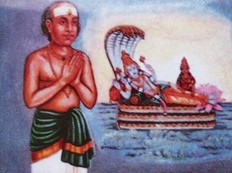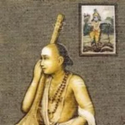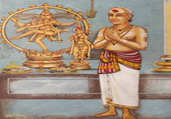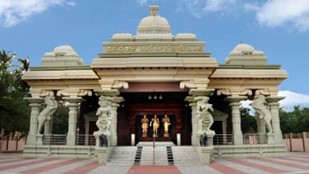PREVIOUS
Tamilisai Moovar of Sirkazhi
April 26 , 2024
360 days
2494
0
(இதன் தமிழ் வடிவத்திற்கு இங்கே சொடுக்கவும்)
Introduction:
- Music and the Tamil landscape have been inseparable since the Sangam Era, with legendary figures shaping its evolution and intertwining it with art, culture, and society.
The Tamil Trinity and Their Contributions:
- Muthu thandavar, Marimutha Pillai, and Arunachala Kavirayar, collectively known as the Tamilisai Moovar or Tamil Trinity, were pivotal figures in Carnatic music's development.
- They composed traditional kritis in Tamil, significantly contributing to its evolution.
- All three, residing in Sirkazhi, Mayiladuthurai district, composed numerous kritis predating renowned composers like Tyagaraja, enriching the Carnatic music tradition.
- While Muthuthandavar's exact period remains uncertain, the Tamil Virtual Academy suggests he lived around the 16th century.
- Arunachala Kavirayar (1711-1779) and Marimutha Pillai (1712-1787) continued their contributions two centuries later.

Arunachala kavirayar
Early Life and Education:
- Arunachala kavirayar was born in 1711 in Tillaiyadi, Tanjore district, as the fourth son of Nallathambi Pillai and Valliammai.
- His father's transition from Jainism to Shaivism influenced his upbringing.
- His education commenced at the Dharmapuram mutt, where he studied Tamil granthas, agamas, and Sanskrit.
Family Life:
- Despite indications of a scholarly future, Arunachala kavirayar chose family life, following the principles of Thiruvalluvar and Kamban's Ramayanam.
- He married and established a jeweler's shop, allowing time for deeper religious studies.
Significant Meeting in Pondicherry:
- A pivotal moment occurred during a trip to Pondicherry, where he met musicians Venkatarama Iyer and Kodandarama Iyer.
- This encounter set the stage for his future endeavours.
Settlement in Sirkazhi:
- Chidambaram Pillai's patronage led Arunachala kavirayar to settle in Sirkazhi, earning him the title 'Sirkazhi Arunachala kavirayar'.
- He immersed himself in scholarly pursuits and collaborations with local musicians.

Creation of 'Rama Nataka Kirtanas':
- Inspired by Kamban's poetic rendition of Sri Rama's life, Arunachala kavirayar composed 'Rama Nataka Kirtanas', an opera accessible to all.
- Its simplicity and melodic appeal resonated widely.
Pursuit of Royal Recognition:
- Despite initial challenges, Arunachala kavirayar sought recognition from King Tulaja Maharaja of Tanjore.
- His perseverance eventually led to royal acknowledgment and patronage from eminent figures like Ananda Ranga Pillai.
Legacy and Contributions:
- Arunachala kavirayar's legacy extends beyond 'Rama Nataka Kirtanas' to include literary works such as 'Ajamukhi natakam', 'Anumar pillai Tamil', 'Sirkazhi sthalapuranam', and 'Sirkazhi kovai'.
- He composed 258 kritis, simplifying verses from Kamba Ramayanam and pioneering Tamil musical drama.
Reverence and Influence:
- Arunachala kavirayar's compositions continue to be revered by musicians and performers, offering a source of comfort and artistic inspiration.
- His 'Rama Natakam', also known as Sangeetha Ramayanam, remains a timeless expression of Tamil cultural heritage.
Marimutha Pillai
Early Life and Family:
- Marimutha Pillai was born in 1712 in Thillaividangan village near Sirkazhi to a Shaivite family.
- His father, Deivangal Perumal Pillai, instilled a deep devotion to Lord nataraaja in him from a young age.
Musical Prodigy:
- Even in his youth, Marimutha Pillai displayed remarkable talent in composing Tamil songs.

Divine Intervention:
- Marimutha Pillai's devotion led him to pray for his son's return when he left home in pursuit of spiritual fulfilment.
- Lord Nataraaja promised the son's return if Marimutha Pillai composed a prabandham in praise of Chidambaram.
- This resulted in the creation of the famous "Puliyur Venba."
Compositional Style and Contributions:
- Marimutha Pillai's compositions include nearly 25 kritis in 17 ragas, primarily praising Lord Nataraaja.
- His writing style is characterized by refined and clear Tamil, often employing an affectionate yet sarcastic tone.
Notable Works:
- Among his notable compositions are "Orukkaal Shiva Chidambaram," emphasizing the power of uttering Shiva's name for salvation, and "kaalai tooki ninraadum deivame," depicting celestial beings playing musical instruments in praise of the divine.
Legacy and Influence:
- Marimutha Pillai's compositions, though numbering more than 50, are mostly lost to time, with only 25 currently available.
- His songs, connected to the stories of Shiva, continue to inspire devotion and admiration.
- His legacy lives on through his descendants, with some of his compositions held by T.V. Meikandar.
- Marimutha Pillai passed away in 1787, leaving behind a rich musical and spiritual legacy that endures to this day.
Muttu taandavar
Early Life:
- Muttu taandavar, born in 1560 in Sirkazhi, hailed from a family of temple musicians.
- Afflicted by an incurable disease in his youth, and sought solace in the songs of Lord Shiva sung by a lady named Shivabhagyam.
Divine Intervention and Transformation:
- Locked inside a temple one night, muttu taandavar prayed fervently to Lord Brahmapureeshwara for help.
- A young girl, believed to be the goddess Lokanayaki in disguise, provided him with sustenance and guidance.
- Renamed muttu taandavar, he embarked on a transformative journey to Chidambaram.
- Journey to Chidambaram and Compositional Style:
- Guided by divine inspiration, Muttu taandavar composed a song each day upon entering the Chidambaram temple, using the first words he heard from devotees as lyrics.
- His compositions reflected his gratitude and devotion, often narrating his experiences and encounters.

Miraculous Incidents and Compositions:
- Several miraculous incidents marked Muttu taandavar's journey, including his cure from snakebite through the composition "Arumarundondru tanimarundidu" and the parting of the river Kollidam, inspiring the song "kanamal vinile kalam kazhittome."
- His compositions ranged from expressions of gratitude to pleas for spiritual guidance.
Legacy and Contributions:
- Muttu taandavar's compositions, though few in number, have been preserved and set to ragas by Annamalai University.
- These kritis, rescued from obscurity, continue to be sung and cherished, serving as a testament to his enduring legacy.
Musical Innovations:
- Muthu taandavar, another pioneer in Tamil Kritis born in Sirkazhi, composed numerous kritis revering Thillai Natarajar.
- His compositions found a place in both music and dance concerts, particularly focusing on the cosmic dance of Lord Nataraja, known as Tandava Kritis.
Final Act of Union:
- In 1640 AD, Muthu taandavar's life culminated in a divine union with Lord Brahmapureeshwara as he sang the piece "manikkavasagar perenakkutaravallayo ariyen."
- A great light emanated from the sanctum, and muttu taandavar merged with the divine, leaving behind a legacy of devotion and musical innovation.
Honouring Tamilisai Moovar: A Tribute Through Manimandapam
- In 2000, the former Chief Minister M. Karunanidhi proposed the construction of a manimandapam, a memorial, in Sirkazhi town to honour the contributions of Tamilisai Moovar.
- However, the project was delayed for a decade and finally completed in 2011 at a cost of ₹1.51 crore.
- The inauguration took place virtually on February 20, 2013, by then Chief Minister Jayalalithaa.
- Managed by the Information and Public Relations Department, the memorial highlights Tamilisai Moovar's achievements in language and music and provides a venue for meetings.
- In 2022, the State government allocated ₹47.02 lakh for renovation and repair.
- Additionally, this year, ₹3.97 lakh was sanctioned to enhance facilities for scholars and candidates preparing for competitive exams, further honouring Tamilisai Moovar's legacy.

Leave a Reply
Your Comment is awaiting moderation.


